You don’t need to spend $300 monthly on SEO tools to get real results. Actually, some of the best SEO tools under $50 can do everything most businesses need. The problem is knowing which ones actually work and which ones are just fancy dashboards with useless data.
I’ve tested dozens of cheap SEO tools over the years. Most of them are honestly pretty bad. But I found some hidden gems that punch way above their price point. These tools can help you find keywords, track rankings, and figure out what Google actually wants from your content.
Let me share the SEO tools under $50 that I actually use and recommend. No fluff, just the ones that deliver real results without breaking your budget.
Why Expensive SEO Tools Aren’t Always Better
Here’s what nobody tells you about expensive SEO tools. Half the features you’re paying for are stuff you’ll never actually use.
You don’t need 50 different reports if you can’t act on the data anyway.
What most people actually need:
- Keyword research that shows realistic opportunities
- Basic rank tracking for their main keywords
- Content ideas that might actually rank
- Simple competitor analysis
- Technical SEO issue detection
The truth is, a good SEO tool under $50 can handle all of this. You just need to know which ones to pick and how to use them properly.
Top 6 SEO Tools Under $50 in 2026
#1. Pikera SEO: The Game Changer for Keyword Strategy
Let me tell you about Pikera SEO (https://pikeraai.com). You give Pikera SEO your targeted keyword (you’d wanna rank for).
It analyzes what’s currently ranking for that keyword. Then it tells you exactly what it would take for your website to rank there, too.
Pikera SEO tells things like: how many backlinks you need, estimated DA score required, how long it might take for your site to rank higher, technical issues to fix, and what content actually helps you rank higher.
❓What makes it different:
• Tells you how many backlinks you’d need to rank for your targeted keyword
• Shows realistic timelines for when you’ll rank
• Points out website problems that might hurt your rankings
• Explains what type of content actually works
✅ It is perfect for:
• Knowing if a keyword is worth your time
• Getting clear steps instead of confusing data
• Understanding realistic ranking timelines
• Creating content that actually ranks
How Pikera SEO Works
Think of it like Google saying, “Hey, if you want your content to show up when someone searches for this keyword, here’s exactly what you need.“
What you put in:
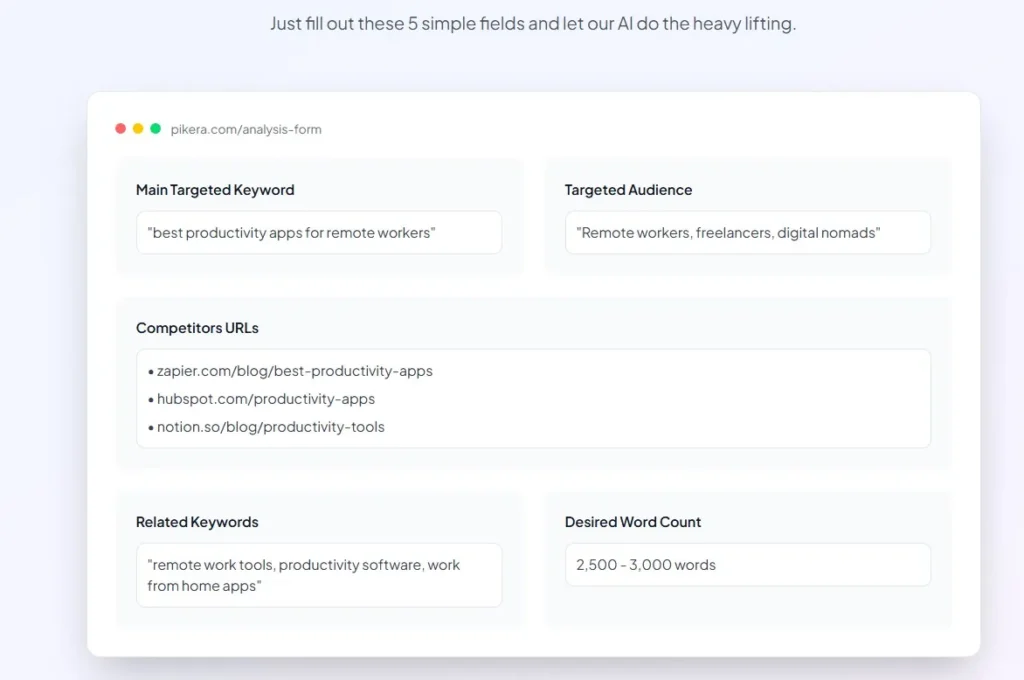
You type your target keyword like “best productivity apps for remote workers
What you get back:
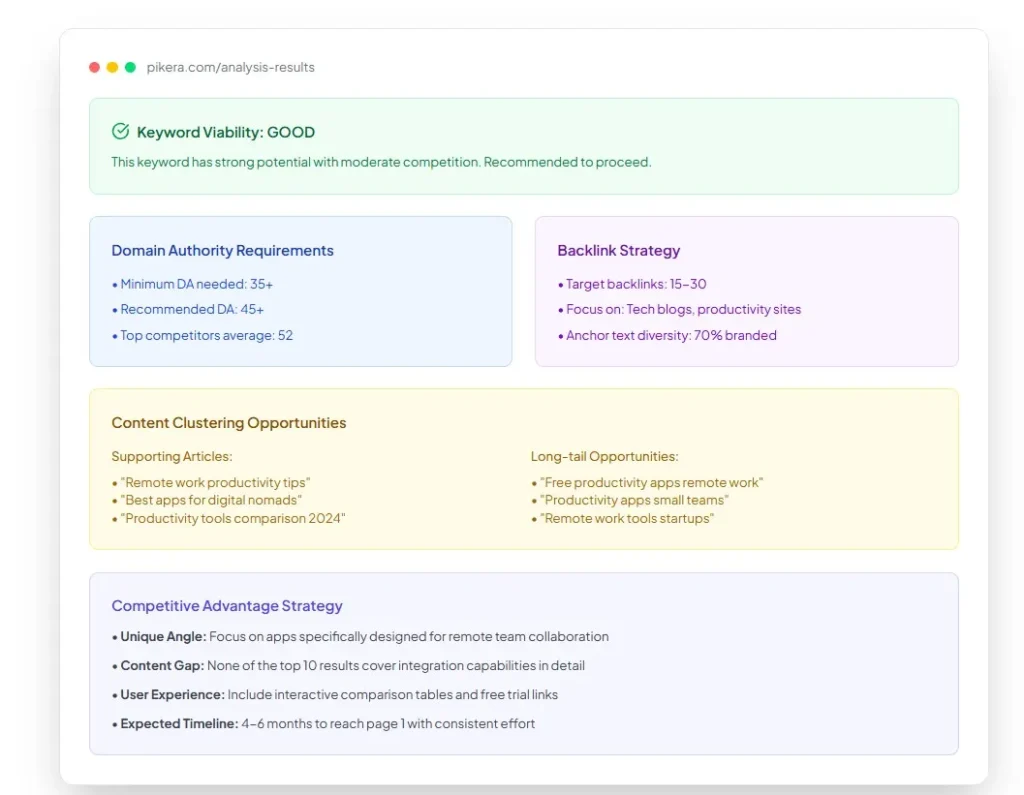
• You need 25 backlinks from websites with good authority
• Your website needs a domain authority of 35 or higher
• It’ll probably take about 4 months to rank
• Your content should focus on remote team collaboration features
• Your website should load in under 3 seconds
A quick Demonstration video:
Clearly, no more “it depends” answers. Just clear requirements.
Right now, Pikera SEO is in early access with a waitlist at: https://pikeraai.com/waitlist. You can see more about how it works at https://www.pikeraai.com/how-it-works.
#2. Ubersuggest: Keyword Research on a Budget
Neil Patel’s Ubersuggest is probably the most popular SEO tool under $50. At $29 monthly, it gives you solid keyword research without the crazy price tag.
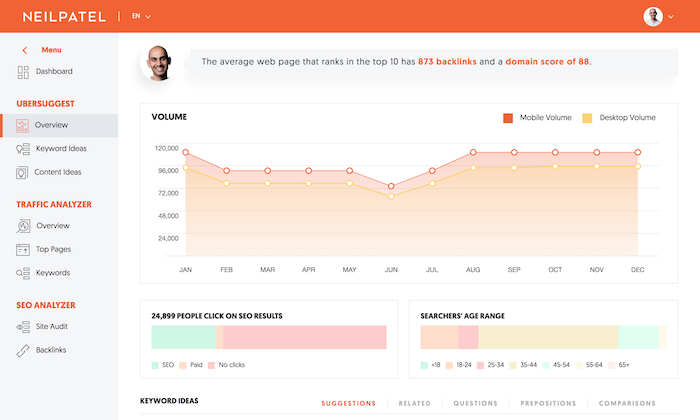
❓What it does well:
- Shows search volume and keyword difficulty
- Basic competitor keyword analysis
- Content ideas based on top-performing posts
- Simple rank tracking features
- Domain overview with organic traffic estimates
✅ Best for these situations:
- You’re just starting with SEO and need basic data
- Keyword research for blog content planning
- Checking what keywords competitors rank for
- Getting content ideas that might actually work
Real example: A local bakery used Ubersuggest to find “custom birthday cakes [city name]” instead of just “birthday cakes.” The local keyword had way less competition and brought in actual customers.
#3. KWFinder: Long Tail Keyword Discovery
KWFinder by Mangools costs around $49 monthly, but it’s honestly one of the best tools for finding those hidden gem keywords that bigger sites ignore.
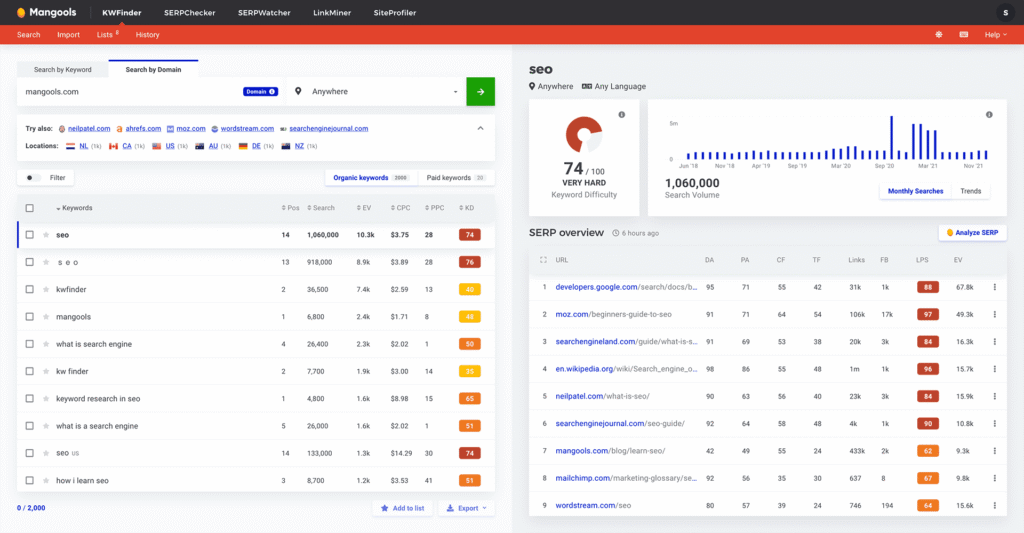
❓Why it’s different:
- Focuses specifically on long tail keywords
- Shows actual difficulty scores that make sense
- Great for finding location-based keywords
- Clean interface that doesn’t overwhelm you
✅ Perfect for:
- Finding keywords with 100 to 1000 searches
- Local businesses targeting specific areas
- Content creators who need topic ideas
- Anyone tired of fighting impossible competition
Mini case study: An online fitness coach found “home workouts for busy moms” using KWFinder. The keyword had 800 searches monthly, but low competition. She ranked #2 within 4 months and now gets 50+ leads monthly from that single post.
#4. AnswerThePublic: Free Question Keyword Generator
This one’s actually free, but it’s so useful I had to include it. AnswerThePublic shows you exactly what questions people ask about your topics.
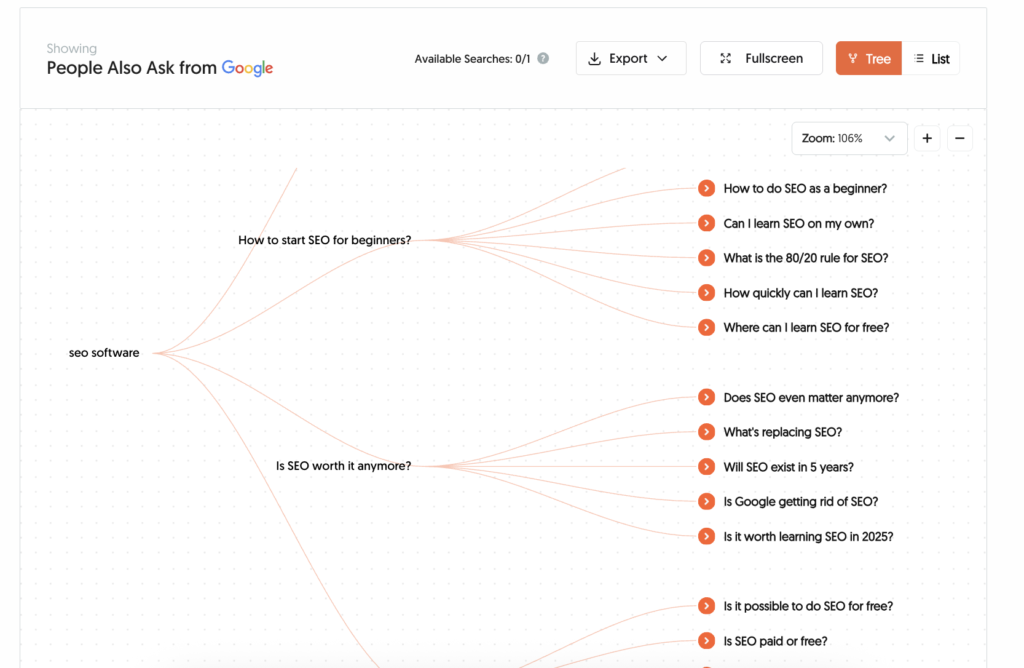
❓How it helps:
- Finds question-based keywords naturally
- Shows “people also ask” type queries
- Great for content ideas that answer real questions
- Helps you understand search intent better
✅ Best use cases:
- Creating FAQ sections that might rank
- Finding blog post topics with clear search intent
- Understanding what your audience actually wants to know
- Building content around real customer questions
Quick tip: Combine this with other tools. Use AnswerThePublic for ideas, then check difficulty with KWFinder or Ubersuggest.
#5. SE Ranking: All in One Under $50
SE Ranking offers plans starting at $44 monthly and gives you almost everything you need in one place. It’s honestly one of the most complete SEO tools under $50.
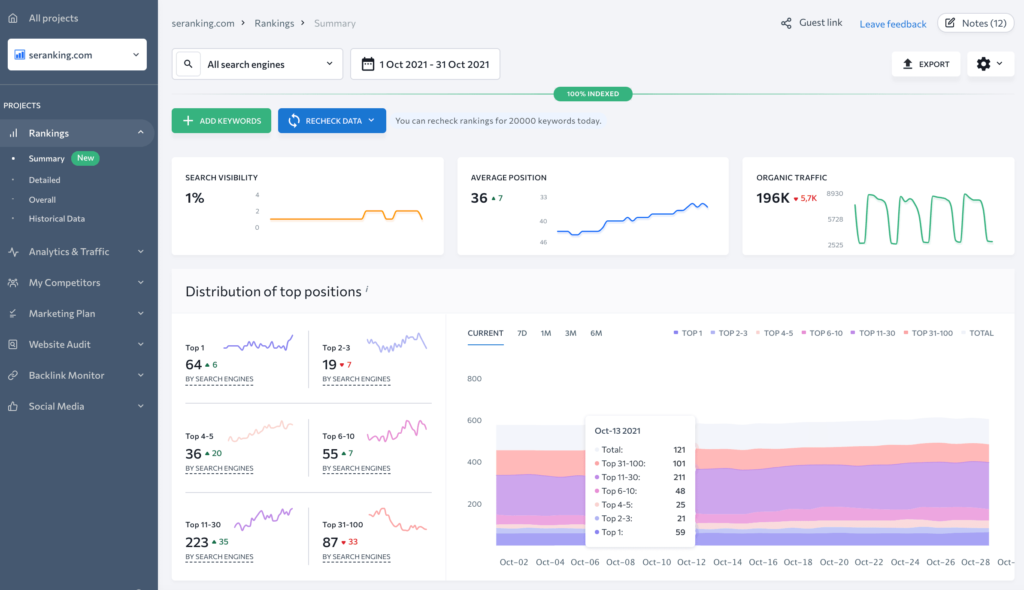
❓What you get:
- Keyword research and difficulty analysis
- Rank tracking for unlimited keywords
- Website audit that finds technical issues
- Competitor analysis and backlink checking
- Content optimization suggestions
✅ Perfect for:
- Small agencies managing multiple clients
- Businesses that want everything in one tool
- People who hate switching between different platforms
- Anyone doing serious SEO on a budget
#6. Google Search Console: The Free Essential
I know it’s free, but Search Console is honestly more valuable than most paid tools. It shows you exactly what Google thinks about your website.
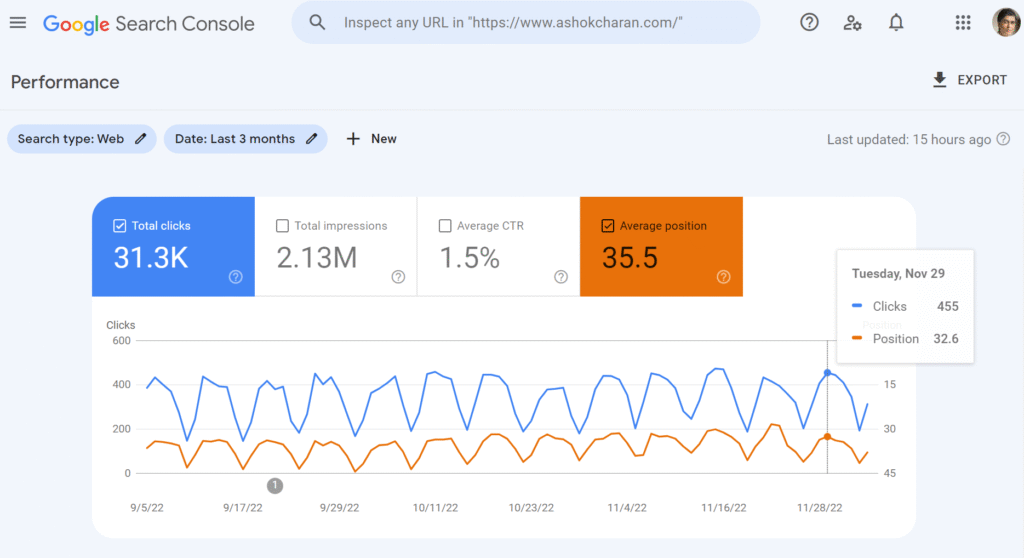
❓Why it’s essential:
- Shows which keywords you already rank for
- Tells you which pages get the most clicks
- Reveals technical issues Google found
- Tracks your ranking improvements over time
✅ How to use it effectively:
- Check weekly for new ranking keywords
- Fix any coverage issues it reports
- Use it to find content that’s almost ranking (positions 11-20)
- Track click-through rates and improve titles
Pro tip: Use Search Console data to find keywords you rank on page 2 for. These are often the easiest wins for improving traffic.
Combining Tools for Maximum Value
Here’s the thing about SEO tools under $50. You don’t need to use just one. Actually, combining 2-3 cheap tools often works better than one expensive one.
My recommended combinations:
For beginners (under $30 monthly):
- AnswerThePublic (free) for ideas
- Ubersuggest ($29) for research and tracking
- Google Search Console (free) for monitoring
For serious SEO (under $50 monthly):
- Pikera SEO for keyword strategy and ranking insights
- KWFinder ($49) for long tail research
- Google Search Console (free) for performance tracking
For agencies (under $50 per client):
- SE Ranking ($44) for client management
- Google Search Console (free) for each client
- AnswerThePublic (free) for content ideas
What to Avoid in Cheap SEO Tools
Not all SEO tools under $50 are worth your money. Here are some red flags I’ve learned to watch for:
Tools that are probably useless:
- Promise instant rankings or guaranteed results
- Only focus on keyword density checking
- Don’t show actual search volume data
- Have interfaces that look like they’re from 2010
- Don’t provide actionable insights, just data dumps
Questions to ask before buying:
- Does this tool solve a specific problem I have?
- Can I take action based on the data it provides?
- Is the interface actually easy to use?
- Do they offer a free trial so I can test it?
Making the Most of Budget SEO Tools
Having cheap tools is one thing. Actually getting results with them is another. Here’s how to maximize your ROI:
Focus on execution, not data collection:
- Pick 3-5 keywords and go deep instead of researching 100
- Actually create the content your tools suggest
- Track rankings monthly, not daily
- Use insights to improve existing content
Don’t get trapped in analysis paralysis:
- Spend 20% of time on research, 80% on execution
- Set limits on how long you spend on tools
- Focus on keywords you can actually rank for
- Remember that perfect data doesn’t guarantee results
Real World Results with Budget Tools
Let me share some actual results I’ve seen from people using SEO tools under $50:
🍱 Local restaurant client:
- Used KWFinder to find “best pizza [neighborhood]”
- Targeted 5 local keywords instead of impossible ones
- Ranked #1 for 3 keywords within 6 months
- Increased online orders by 40%
🔗 B2B SaaS startup:
- Used Pikera SEO to understand ranking requirements
- Focused on keywords they could realistically rank for
- Created content based on actual search intent
- Went from 500 to 5000 monthly organic visitors
💻 Freelance designer:
- Combined AnswerThePublic with Ubersuggest
- Found “logo design for [specific industries]” keywords
- Created service pages for each industry
- Doubled client inquiries in 4 months
The pattern? They all focused on realistic keywords and actually executed instead of just collecting data.
When to Upgrade to Expensive Tools
Eventually, you might outgrow SEO tools under $50. Here’s when it makes sense to upgrade:
Upgrade if you:
- Manage 10+ websites or clients
- Need advanced competitor analysis daily
- Have a team that needs collaboration features
- Process thousands of keywords regularly
- Need custom reporting for clients
Don’t upgrade if you:
- Still have basic technical issues to fix
- Haven’t maxed out your current tools
- Aren’t consistently creating content yet
- Don’t have processes for acting on data
Your Next Steps
If you’re looking for the best SEO tool under $50, start with your biggest pain point. Don’t try to solve everything at once.
If you need a keyword strategy: check out Pikera SEO for realistic ranking insights.
If you want everything basic: Try Ubersuggest for solid all-around features.
If you need long tail focus: Go with KWFinder for hidden opportunities.
If you want a comprehensive tool: Test SE Ranking for complete coverage.
Action plan for this week:
- Pick one tool that solves your biggest SEO problem
- Start with their free trial if available
- Focus on finding 5-10 realistic keywords to target
- Actually create content instead of just researching
Remember, the best SEO tool is the one you actually use to get results. A $30 tool that you use daily beats a $300 tool that sits unused.
The goal isn’t to have perfect data. It’s to rank higher and get more traffic. These SEO tools under $50 can absolutely help you do that if you focus on execution over analysis.









